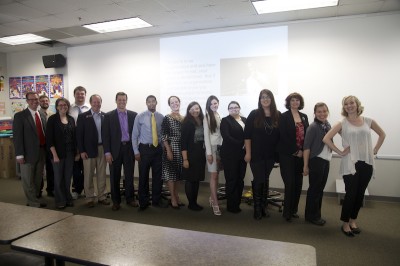by Kimberly Sawatka | Jun 17, 2014

While no English word truly captures the full meaning of the Greek word Arete, its simplest translation is excellence. It is the divine essence of the word, however, that Derek Monjure had in mind when he founded Arete Scholars Fund Inc. As a Student Scholarship Organization (SSO), Arete is dedicated to helping low-income families access quality education at private schools in Georgia. The Breakthrough Fellows and GCO team members recently had the opportunity to visit with Mr. Monjure and Arete’s Director of Communications Buck Alford to learn more about Georgia’s tax credit scholarship program and their role as SSO operators.
For those unfamiliar with Georgia’s tax credit scholarship, the program allows corporations to donate up to 75% of their state income liability to a state approved SSO. Additionally, families are able to contribute up to $2,500. In return, both corporate and individual contributors receive a tax credit for the same amount of their donation. SSOs then use the raised funds to grant scholarships of as much as $8,983 a school year. This money goes directly to families and is used towards placing their child in the partnering private school of their choice. On average, Arete awards scholarships of $4,ooo-$5,000 to the families they serve.
The tax credit scholarship program has been a great opportunity for the more than 15,000 students who have been fortunate enough to receive scholarships. However, many more opportunities exist to eliminate the barriers that bar even more of Georgia’s children from this same benefit. One such opportunity is to raise the overall tax credit program cap, or perhaps remove it all together. The 2014 contribution cap of $58 million was reached in just three weeks. In one regard, this signifies the popularity of the program and desire of Georgians to contribute to quality education. In a less positive regard, reaching the cap so quickly has already affected the SSOs, families, and students whose donors missed the cut off. For Arete, and many other SSOs,
Despite the challenges, the spirit and energy of Arete Scholars remains focused on providing the financial means necessary for students to pursue a level of academic excellence that they would otherwise be unable to access. The organization has even begun expanding its operations into other states, starting with Louisiana. Though Mr. Monjure is quick to say his work is simply transactional, it is clear from his passion that his mission is actually rooted in a higher calling.
by Georgia Center for Opportunity | May 9, 2014
It seems like only days ago I was holding my 18-year old daughter Blair as an infant, and my mother said, “It will go by so fast.” I couldn’t have imagined how right she was. It is unbelievable to me that Blair is about to graduate from high school and go off to college. The memories of being a mother in those early days are so sweet. It was a precious time. And all of the memories since then, good and bad, will always mean so much to me.

As I look back over the years of raising Blair and her sister Anna, the memories sometimes all run together as one large mosaic. There are so many little things that happened along the way that I just can’t remember, but wish I could. Some days I would do almost anything to have their sweet little pre-school faces back to kiss, just one more time. They were both so smiley, giggly and sweet. I did all I could to keep them as happy as possible. I wanted their lives to be filled with singing, laughing, hugging, and as little crying as possible.

Time moved on and began to speed up. Days, weeks and years were filled with school, dance, piano, cheerleading, gymnastics, voice lessons, church choir, doctor visits, dentist visits, more dance, and then, even more dance. There was driving, lots and lots of driving…so much driving. All along the way there were opportunities to teach them how to be the beautiful, intelligent, responsible young women that they are today. I took a lot of those opportunities, but lost a lot as well, probably because I was just plain tired. Fortunately, they had many other people in their lives to pick up the slack.

The teenage years began, and so did the tension. This is when instinct no longer did the trick. This is when many of the parenting mistakes occurred. This is when I screwed up a lot. This is when they realized I wasn’t so perfect, and sometimes even hated me. This is when I sometimes hated myself. This is when I found out what I was made of. This is when I learned what it really means to be a mother.

Now that they are 18 and 16, one leaving us soon, the other a new driver, I think about how this stage of my life is quickly coming to an end. They soon will both be off doing wonderful and exciting things. And, although it often hurts to think of them leaving, I know that I have done my job well and that they will be successful, and I pray, happy adults. What I have learned from this motherhood experience is that being a good mother requires you to accept your imperfections and admit to your mistakes, but also to enjoy the end product, your children, and know that YOU did it. Take the credit. Be proud of yourself, and be happy that you have invested yourself as a mother. I know I am.
by Eric Cochling | May 5, 2014

A little over a week ago, I had the pleasure of speaking on a panel at Georgia Gwinnett College to a group of students, including some future educators, students from the school’s honors program, and a few professors, who had been reading about the impact of school choice in America and in other parts of the world.
In my remarks, I noted that Brown was successful in eliminating official, legal enforcement of segregation and paved the way for integrated schools and gains in minority student achievement. Today, we don’t find government officials claiming a legal right to physically block a child’s entrance to a school because of his or her race. By that measure, Brown hit its mark.
Instead, in 2014, what we witness is a very different kind of school segregation driven largely by the zip code in which a child lives, which is largely a function of income.
Today, children are not so much being locked out of schools they would like to attend, as much as they are being locked into schools they wouldn’t choose if given an option.
This is especially true for lower and middle-income families who likely do not earn enough to move to a district with great schools or afford the cost of private tuition.
This is where school choice is able to help.
Given control over their education dollars (over $9,000 per year per student on average in Georgia), parents and their children would have the ability to select the school best suited for their needs, whether public, private, virtual or otherwise. Since each family would be given, essentially, the same base level of purchasing power, segregation based on income (enforced now by our zip code system) would be much less of a barrier.
For areas of the state, especially in more rural communities, where the local public school may be the only option right now, giving parents control of those education dollars would likely mean entrepreneurs would soon find ways to make additional options available, as each class of students (assuming an average of 23 children) would bring with them over $200,000 of funding each year. You can pay a teacher very well and buy a lot of materials with that kind of money.
Americans value choice in all areas of life and instinctively understand that the choices we make with our money drive improvements in the products we buy, whether the product is the food we eat, the houses we live in, or the cars we drive. The same thing could be true relative to the education our children receive.
The system will improve if we are allowed to vote with our wallets. It most likely will not until then.
For more reading on the power of school choice and creative ways communities are making it possible (in the US and abroad), I highly recommend the books that the students at GGC read this year:
Education Freedom In Urban America: Brown Vs. Board after Half a Century
By: David Salisbury and Casey Lartigue Jr.
The Beautiful Tree
By: James Tooled
Market Education: The Unknown History
By: Andrew J. Coulson
Why America Needs School Choice
By: Jay P. Greene
by Kimberly Sawatka | Apr 17, 2014
Below is a guest blog by Dr. Eric Wearne of Georgia Gwinnett College and formerly with the Governor’s Office of Student Achievement. Dr. Wearne currently leads GCO’s College & Career Pathways working group.
**********************************

In its 2013 Report Card, Digital Learning Now, a project of the Foundation for Excellence in Education, argued:
State policy can remove barriers to innovative approaches or it can stifle them with restrictions, red tape, and reinforcement of traditional, unsustainable approaches. It can accelerate reform or it can further entrench the status quo. Without changing state policy, innovative tools and models will fail to scale.
According to the Report Card, however, the news is good:
“states are rising to the challenge of supporting next generation models of learning. In 2013, states debated more than 450 digital learning bills with 132 signed into law. This builds on a record year in 2012 when state lawmakers introduced nearly 700 bills and signed 152 into law.”
To explore these issues specifically, Georgia Center for Opportunity’s College and Career Readiness Working Group heard from Sam Rauschenberg, Deputy Director of the Governor’s Office of Student Achievement, who facilitated the Task Force, and Carla Youmans, Instructional Technology Specialist at South Forsyth High School in Forsyth County, who is coordinating a new hybrid program at that school.
The Governor’s Digital Task Force
In 2012, Governor Deal created a task force to look into online learning in Georgia. The Governor’s Digital Learning Task Force met over the course of 2012-13, and provided recommendations to Governor Deal in December of last year. The Task Force’s recommendations fall into three categories:
- Infrastructure
- Digital Content and Courses
- Blended and Competency-Based Learning
The state has already started to implement some of the Task Force’s recommendations on infrastructure. For example, the FY15 budget includes $3.9 million to connect school systems to the University System’s PeachNet. The AFY14 and FY15 budgets also include $14 million in bond funds to the Georgia Department of Education for district and school grants for equipment required to receive and use added bandwidth (edge devices, LAN, wireless, etc.), and $25 million in general funds to the One Georgia Authority for grants to support extension of high-speed internet access in schools.
Still, opportunities exist in the areas of digital content and courses, and experimenting with new models for blended and competency-based learning. For example the state, via the Georgia Department of Education, currently provides teachers with access to lesson and video content online. However, to maximize teachers’ use of the materials and the potentially transformative power of online learning, much more can be done. The working group discussed the concept of course choice, as has been adopted in Louisiana, and the idea of opening online schools developed in one school system to students from any other school system. Conceptually, the competition should make for improved products and services, all for the purpose of better serving Georgia children. The Governor’s Task Force report alludes to barriers that could make online learning easier and higher-quality. Enabling competition and other market-based approaches would help do that.
South Forsyth High School Hybrid
One school in Georgia that is experimenting within current structures is South Forsyth High School. South Forsyth is preparing to offer a hybrid schedule to a select group of students next year. Mondays are “synchronous”: students will sign on to their class websites when school starts, teachers will teach them online for a portion of the class period, and then students will work independently at home for the rest of the period. Then students will check in again when their next class starts. Tuesdays, Wednesdays, and Thursdays, students come to campus and attend class as all other SFHS students do. Fridays are “asynchronous”: students receive their assignments online, but are free to complete them at their own speed. If a students’ grade drops below a certain level, however, that student is obligated to come in and meet individually (or in very small groups) with the teacher. The implications of this kind of system are many: struggling students can be identified and also given individual help more easily, and within the normal time constraints of a school week; students receive the kind of practice in self-regulation they will need in college; etc.
South Forsyth’s arrangement may not work for every school or every student, and digital learning overall is still in its infancy – we simply don’t yet know the best methods or all the possibilities involved with online learning. But as one task force member argued, we don’t necessarily need one 100 percent solution to improve student achievement and to increase opportunities; we could be successful with 100 one percent solutions. The Governor’s Task Force and South Forsyth High School’s hybrid program play important parts in state and local experimentation that can lead to better outcomes for Georgia students.
by Georgia Center for Opportunity | Apr 14, 2014
Governor Deal signed the criminal justice reform bill, SB 365, into law this past Sunday at Antioch Baptist Church in Gainesville.
This special morning service marked an important milestone for prisoner reentry reform in Georgia and is a testament to the extensive collaboration that has taken place over the last year from the state level down to the community level.

The state has zeroed-in on criminal justice reform for three years now, passing important legislation to improve adult sentencing (2012 and 2013), juvenile justice (2013), and prisoner reentry (2014). The first two reforms were projected to save the state $264 million over a five-year-period, as an increasing number of non-violent offenders are released from prison and placed under community supervision. This move allows expensive prison beds to be reserved for those who pose the greatest threat to society, while providing those with drug addictions and mental health issues the opportunity to receive needed treatment in the community.
Already, the outcome of these reforms has been significant – the state’s prison population has dropped from 57,295 to 53,000 offenders in just two short years, saving the state an estimated $21,000 per inmate per year.
The Governor is hopeful that we will see the same sort of progress made in the realm of prisoner reentry as SB 365 takes effect. This bill makes three important reforms that will assist ex-offenders in obtaining employment:
- It mandates that private background check agencies update their criminal history information on a monthly basis and permanently delete any records that have been restricted or of persons who have been exonerated (absolved from guilt);
- It provides employers a certain level of protection from negligent liability hiring by exercising due care in hiring ex-offenders who have received a Program and Treatment Completion Certificate or a pardon;
- It gives judges discretion in determining whether an offender’s license should be suspended or not for a non-driving-related drug offense.
The success of this reform will be measured with a decreased recidivism rate and increased employment rate among offenders returning to their communities.
Georgia Center for Opportunity is proud to have played a role in influencing the recommendations made by the Georgia Council of Criminal Justice Reform to the state legislature in January 2014, which ultimately made their way into SB 365. GCO has been researching this issue over the past year-and-a-half and believes the state is taking the right approach in working to provide offenders greater access to job opportunities.
Hopefully new bills introduced in subsequent legislative sessions will implement the remaining recommendations made by the Criminal Justice Reform Council on ways to improve the reintegration of offenders in Georgia.
Read more about the signing of this important reform in the Gainesville Times, posted April 14, 2014: http://www.gainesvilletimes.com/section/6/article/98202/ .








